|
|
|
Sort Order |
|
|
|
Items / Page
|
|
|
|
|
|
|
| Srl | Item |
| 1 |
ID:
108996
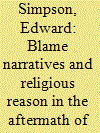

|
|
|
|
|
| Publication |
2011.
|
| Summary/Abstract |
Recent writing on religion in Gujarat has often confused political rhetoric with common religious belief and practice. Thus, religious categories have become caricatures standing for sociological realities and totalised worldviews. In this scheme, 'Hindus' and 'Muslims' are supposed to believe different things which ensure that they see and act in the world quite differently. In this paper, I examine the narratives of blame that emerged after the 2001 earthquake in Gujarat. The ethnography suggests that although religious identity plays a role in the way blame is cast, people of different religious communities also use common frames of logic and their shared experiences of shock and alienation to explain catastrophe. The religious reasoning of blame narratives is therefore shown to have a broader cultural existence outside the boundaries of particular religious identities.
|
|
|
|
|
|
|
|
|
|
|
|
|
|
|
|
| 2 |
ID:
109157
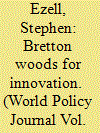

|
|
|
| 3 |
ID:
108994
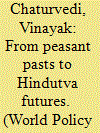

|
|
|
|
|
| Publication |
2011.
|
| Summary/Abstract |
This paper considers the participation and initiation of communities once classified as criminal tribes in the violence in Gujarat in 2002. Given that their descendants continue to suffer politically and economically in post-colonial India, it is necessary to examine the role of the marginalised and subordinate communities in the making of Hindutva in the twenty-first century. Building upon debates on violence in post-colonial societies, the paper examines the historical contexts for why victims often become killers in genocide. More specifically, it provides an analysis of one specific community of poor, low-caste peasants, the Dharalas, who participated in the violence against Muslims in Gujarat. The paper also examines the limits of historical methodology for the writing of histories of violence from 'below'.
|
|
|
|
|
|
|
|
|
|
|
|
|
|
|
|
| 4 |
ID:
108987
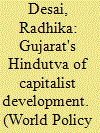

|
|
|
|
|
| Publication |
2011.
|
| Summary/Abstract |
Commentators contemplating the hold of Hindutva in Gujarat swing between anxiously wondering whether it shows where the rest of the country is headed and complacent insistence that it is exceptional. Against the background of a wider understanding of the main drivers of Hindutva, and the pattern of its differential advance in the States and regions of India, this paper argues that the hold of Hindutva in Gujarat can be explained by a combination of three factors: aspects of its inherited caste and class structure; the levels and patterns of capitalist development; and the patterns of social polarisation their combination has produced. Given the historic fragmentation of its upper castes, Gujarat's specificity in providing exceptionally fertile ground for the growth and stabilisation of Hindutva can be attributed to the fast pace of its capitalist development and consequently fast economic advance of its middle castes and their social and political assimilation into the formerly Savarna ruling bloc through Hindutva. Given that the differences of inherited social structure and culture are differences of degree and not quality, and that capitalist and neo-liberal development is not questioned, indeed is zealously pursued everywhere in India, and given that social polarisation is considered an acceptable cost of development, Gujarat could well be the image of India's future.
|
|
|
|
|
|
|
|
|
|
|
|
|
|
|
|
| 5 |
ID:
109156
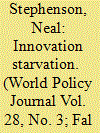

|
|
|
| 6 |
ID:
109162
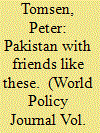

|
|
|
| 7 |
ID:
109006
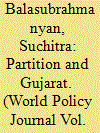

|
|
|
|
|
| Publication |
2011.
|
| Summary/Abstract |
Compared to Punjab and Bengal, Gujarat's experiences of the Partition of India in 1947 remain curiously under-researched even though the state has a long border with Pakistan and over a million people migrated to Gujarat, mostly from neighbouring Sindh. This paper seeks to fill this lacuna in Partition scholarship by examining the experiences of two Hindu groups, Sindhis and Gujarati Dalits, who left Sindh to settle in Ahmedabad. Drawing on the oral testimonies of migrants, the paper shows that while the official logic of Partition might have been predicated on irreconcilable religious identities, the actual experience of Partition brought into play multiple identities arising from regional, caste and community affiliations as well as gender, which migrants drew on in order to cope with the upheaval caused by Partition.
|
|
|
|
|
|
|
|
|
|
|
|
|
|
|
|
| 8 |
ID:
108990
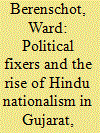

|
|
|
|
|
| Publication |
2011.
|
| Summary/Abstract |
Political fixers are intermediaries who use political contacts and knowledge of official procedures to facilitate the interaction between citizens and state institutions. Fixers have become a prominent feature of India's democracy as facilitators of clientelistic exchanges between voters and politicians. Through a discussion of the functioning of political fixers in Gujarat's main city, Ahmedabad, this article argues that changes in voting behaviour can be explained by looking at (changes in) the way political fixers provide access to state resources. I argue that Hindu nationalist organisations managed to gain popularity among backward castes in Gujarat because of the dependence of these communities on political fixers. As the networks of older political fixers collapsed, Hindu nationalist organisations could win a local following by offering political fixers from backward castes new channels to access state resources.
|
|
|
|
|
|
|
|
|
|
|
|
|
|
|
|
| 9 |
ID:
108984
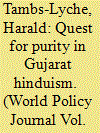

|
|
|
|
|
| Publication |
2011.
|
| Summary/Abstract |
Gujarat has been profoundly marked by its location at the centre of traditional trade networks which, I have argued elsewhere, has strengthened the position of its merchant communities relative to other parts of India. Here I propose that merchant religion, with its stress on purity, has displaced folk Shaktism as well as Brahminic ritual among Gujarat's wider population, to form the core of a modern Gujarati Hinduism, which includes Hindutva. This development, I hold, has been imbricated in the spread of bourgeois culture, making for a particular religious colouring of modernity in Gujarat, and contrasting with the 'secularism' which-perhaps exaggeratedly-has been held to characterise Occidental modernity.
|
|
|
|
|
|
|
|
|
|
|
|
|
|
|
|
| 10 |
ID:
109009


|
|
|
|
|
| Publication |
2011.
|
| Summary/Abstract |
The role of religion in contemporary Gujarat remains both contradictory and highly contested: the rise of politicised Hinduism and Islamism, which has gained strength in recent decades, remains at odds with the many forms of everyday religious practice which blur the boundaries of more reified religious doctrine. This article examines the practices around Sufi shrines in a commuter town in Central Gujarat and, in particular, the lives of three pirs (saints) who maintain a significant following among different religious communities. Through an analysis of the precarious position of Sufi shrines in contemporary Gujarat, I will suggest that Islam has, much akin to Hinduism, become a site of contestation in which the politics of identity formation do not necessarily sit easily with everyday beliefs and practices that continue to be widely practised. As such, the article seeks to problematise widespread assumptions which often conflate religion as a personal experience with its role as a marker of social and political identity.
|
|
|
|
|
|
|
|
|
|
|
|
|
|
|
|
| 11 |
ID:
108981
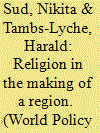

|
|
|
| 12 |
ID:
109000
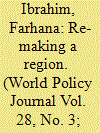

|
|
|
|
|
| Publication |
2011.
|
| Summary/Abstract |
Ethnographic research conducted among the semi-nomadic Muslim Jatts, who inhabit the interstices of the contemporary State both discursively as well as physically, helps us to critically interrogate the formulation of region as articulated both by the modern nation-state as well as contemporary religious ideology. In the official discourse of Gujarat State, the Jatts are represented as threats to the territorial integrity of the nation-state in general and to Gujarat in particular, their cross-border movements into Pakistan designed to destabilise the region. An ethnographic analysis of the state shows how state ideologies are produced discursively over time. This paper argues that travel and trade links in this region have produced historically-blurred boundaries between region, religion and now nation. These histories productively re-configure the current geopolitical iteration of space and belonging in contemporary Gujarat as enunciated by the state.
|
|
|
|
|
|
|
|
|
|
|
|
|
|
|
|
| 13 |
ID:
109161
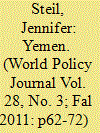

|
|
|
|
|
|
|
|